Unit 2 How often do you exercise Section B课件 人教版英语八年级上册
文档属性
| 名称 | Unit 2 How often do you exercise Section B课件 人教版英语八年级上册 | 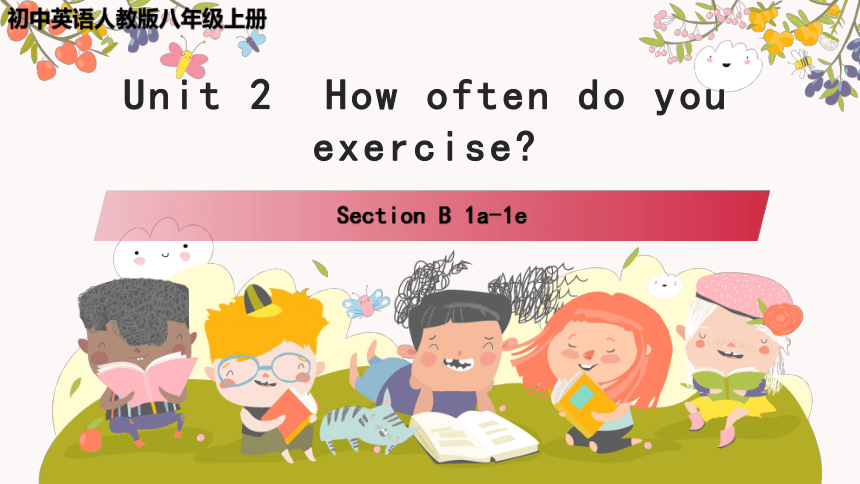 | |
| 格式 | pptx | ||
| 文件大小 | 4.0MB | ||
| 资源类型 | 试卷 | ||
| 版本资源 | 人教新目标(Go for it)版 | ||
| 科目 | 英语 | ||
| 更新时间 | 2024-09-26 17:51:11 | ||
图片预览

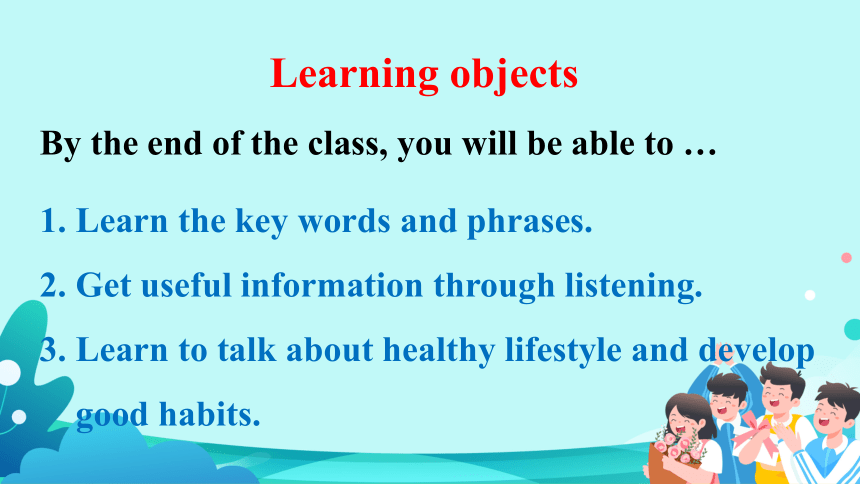
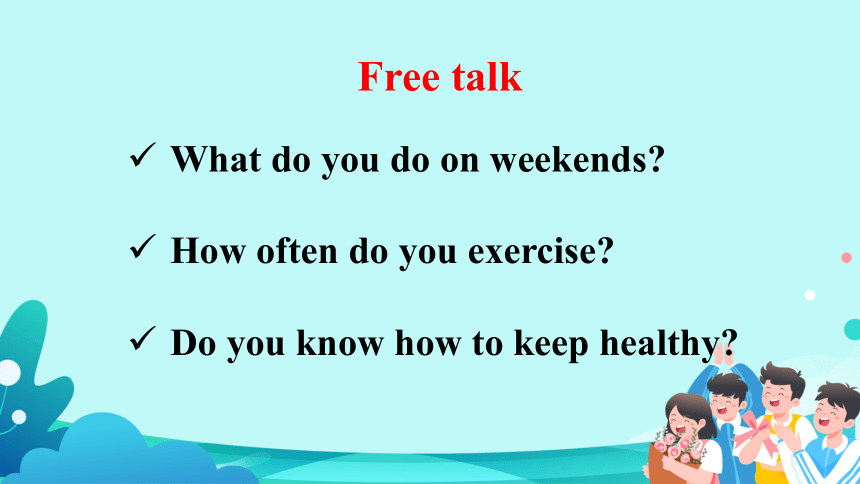
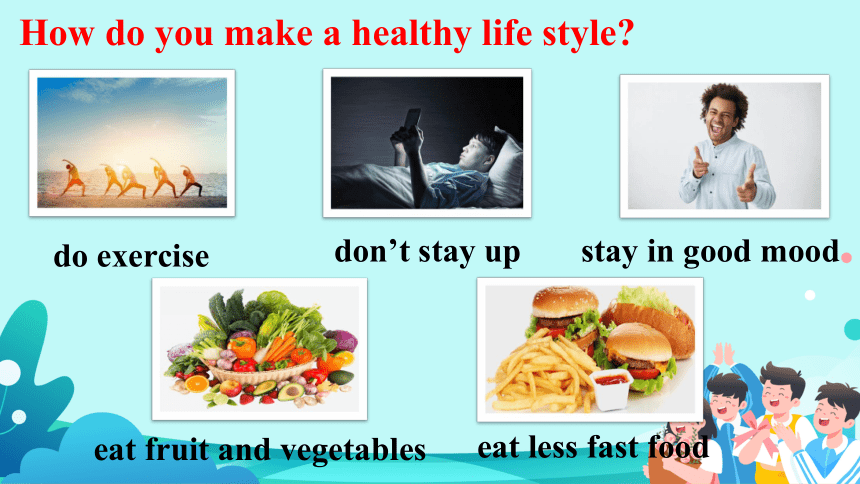
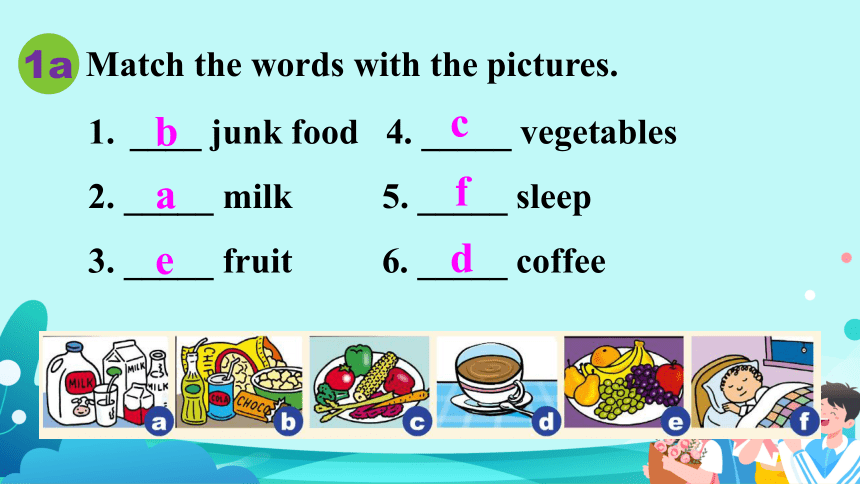
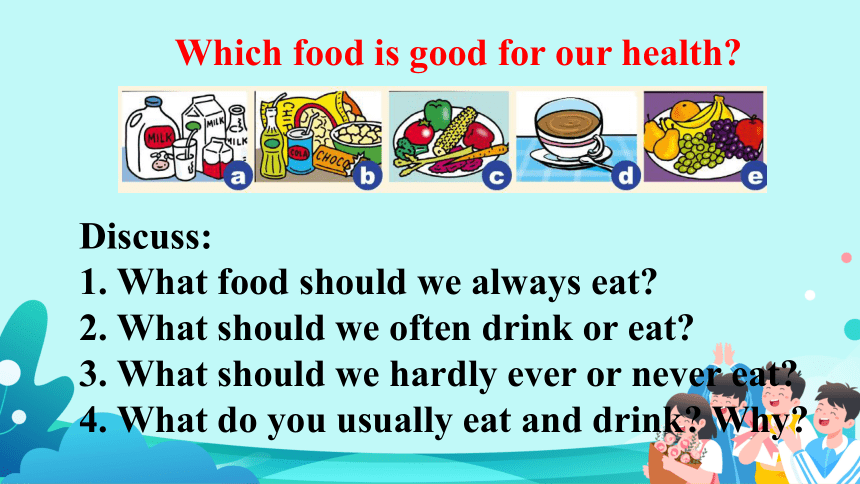

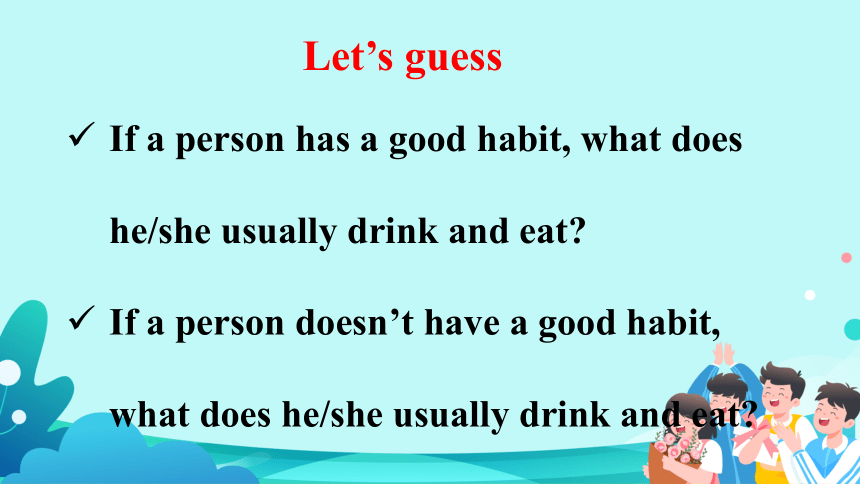
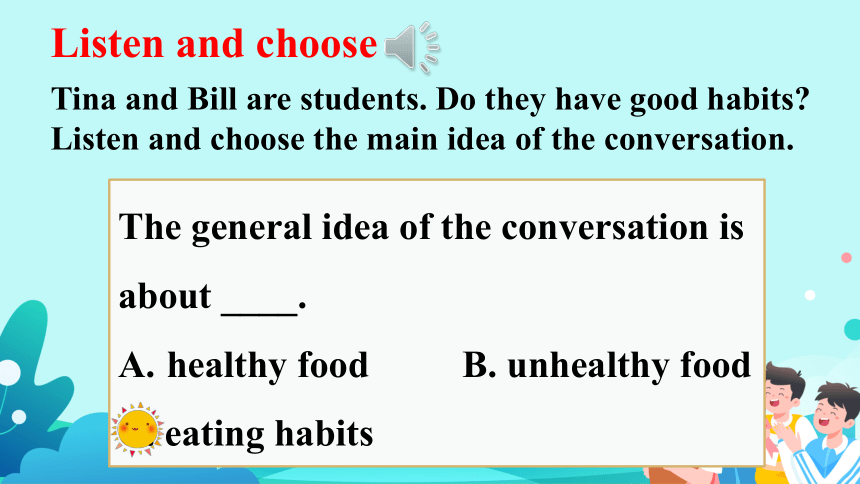
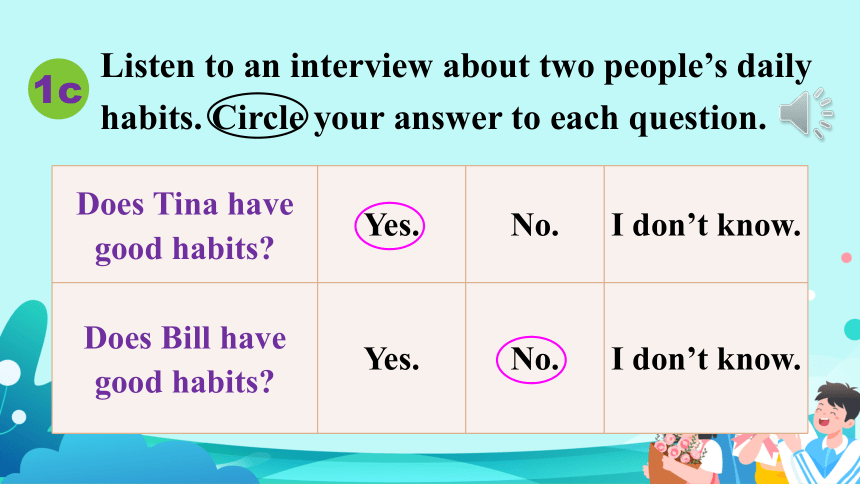
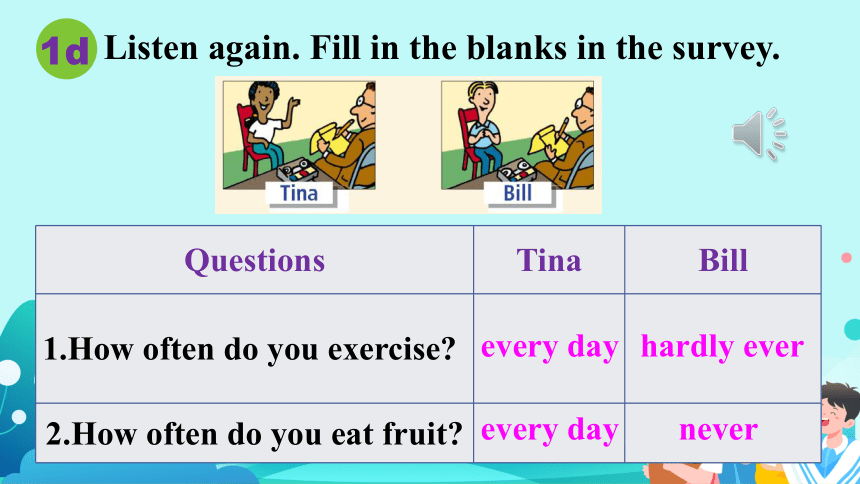
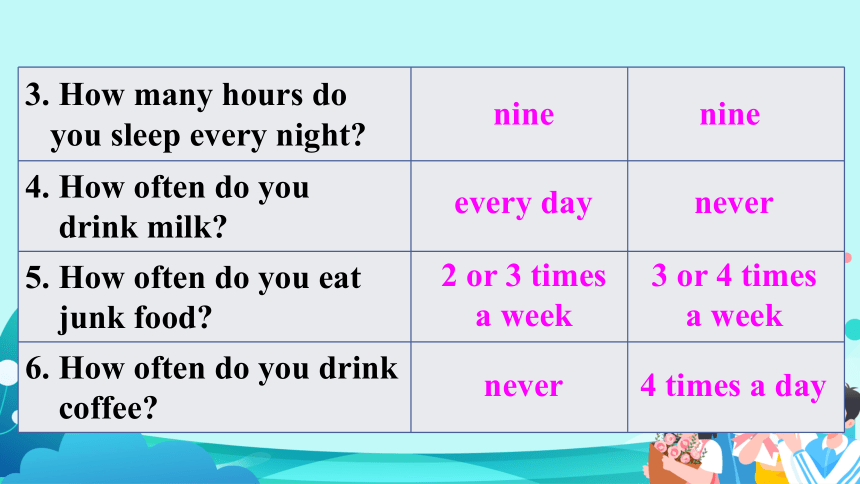
文档简介
(共78张PPT)
初中英语人教版八年级上册
Section B 1a-1e
Unit 2 How often do you exercise
Learning objects
By the end of the class, you will be able to …
1. Learn the key words and phrases.
2. Get useful information through listening.
3. Learn to talk about healthy lifestyle and develop
good habits.
Free talk
What do you do on weekends
How often do you exercise
Do you know how to keep healthy
How do you make a healthy life style
do exercise
eat less fast food
eat fruit and vegetables
don’t stay up
stay in good mood
Match the words with the pictures.
1a
____ junk food 4. _____ vegetables
2. _____ milk 5. _____ sleep
3. _____ fruit 6. _____ coffee
b
a
e
c
f
d
Which food is good for our health
Discuss:
1. What food should we always eat
2. What should we often drink or eat
3. What should we hardly ever or never eat
4. What do you usually eat and drink Why
Ask and answer questions. Use the words from 1a.
1b
A: How often do you drink milk, Liu Fang
B: I drink milk every day.
A: Do you like it
B: No. But my mother wants me to drink it.
She says it’s good for my health.
be good for对……有益,反义短语:be bad for
拓展:be good at=do well in 擅长
be good with 善于应对
be good to 对……友好
be/stay/keep in good/bad/poor health 健康状况良好/不好
拓展health的相关词:
healthy adj. 健康的 healthily adv. 健康地
unhealthy adj. 不健康的 unhealthily adv. 不健康地
Let’s guess
If a person has a good habit, what does he/she usually drink and eat
If a person doesn’t have a good habit, what does he/she usually drink and eat
Listen and choose
Tina and Bill are students. Do they have good habits Listen and choose the main idea of the conversation.
The general idea of the conversation is about ____.
healthy food B. unhealthy food
C. eating habits
Listen to an interview about two people’s daily habits. Circle your answer to each question.
Does Tina have good habits Yes. No. I don’t know.
Does Bill have good habits Yes. No. I don’t know.
1c
Listen again. Fill in the blanks in the survey.
Questions Tina Bill
1.How often do you exercise
2.How often do you eat fruit
every day
never
every day
hardly ever
1d
3. How many hours do you sleep every night
4. How often do you drink milk
5. How often do you eat junk food
6. How often do you drink coffee
nine
every day
nine
3 or 4 times a week
never
2 or 3 times a week
never
4 times a day
Interviewer: Hi, Tina and Bill. Let’s start with the
first question. How often do you exercise
Tina: Every day.
Bill: Hardly ever.
Interviewer: How often do you eat vegetables and fruit
Tina: I eat vegetables and fruit every day.
Bill: I sometimes eat vegetables. But I never eat
fruit.
Tapescripts:
Interviewer: OK. How many hours do you sleep
every night
Tina: Nine.
Bill: Me, too.
Interviewer: How often do you drink milk
Bill: Never. I can’t stand milk.
Tina: Oh, I love milk — I drink it every day.
Interviewer: How often do you eat junk food
Bill: I eat it three or four times a week.
Tina: I guess I eat it two or three times a week.
Interviewer: And how often do you drink coffee
Bill: Oh, I drink coffee four times a day.
Tina: I never drink coffee.
Interviewer: Well, thank you very much.
Bill/Tina: You’re welcome.
Fill in the blanks and retell.
Tina and Bill are classmates. Tina has _________. She _______, ___________________, and _____ ____ every day. She sleeps ____ hours every night. She never drinks _____ and she sometimes eats ________. But Bill doesn’t have good habits. He usually eats ________. He doesn’t often eat _______________. He can’t stand ____ and _________ exercises.
good habits
exercises
eats fruit and vegetables
drinks
milk
nine
coffee
junk food
junk food
fruit and vegetables
milk
hardly ever
Student A is the reporter. Student B is Tina or Bill. Ask and answer questions. Then change roles.
A: How often do you exercise
B: I exercise every day.
A: And how often do you…
1e
Do a survey
1. How often do you exercise
2. How often do you eat fruit
3. How many hours do you sleep every night
4. How often do you drink milk
5. How often do you eat junk food
6. How often do you drink coffee
Ask your classmates the following questions and then report.
Summary
Get useful information through listening.
To be able to use “How often …” and adverbs of frequency to make conversations.
初中英语人教版八年级上册
Section B 2a-2e
Unit 2 How often do you exercise
Learning objects
By the end of the class, you will be able to …
1. Learn the key words and useful expressions.
2. Learn about the features of the expository
writing.
3. Learn to lead a healthy life and do more
exercise.
Do a survey
What do you do in your free time
What activities do you think are good for our mental and physical health
Rank these activities according to how often
you think your classmates do them (1=most often, 6= least often).
watch TV
go to the movies
exercise or play sports
use the Internet
play computer games
go camping in the country
1
3
4
2
5
6
2a
Fast reading
1. Read the article in 2b and choose.
1). What’s the main idea of the passage
A. what No. 5 High School students do in
their free time
B. students’ favorite activities
C. healthy habits
D. the most popular activities
Reading skill: We can get the main idea from the title, the first and the last paragraph.
2). What kinds of activities are mainly talked about
A. exercise
B. use of Internet
C. watch TV
D. play basketball
B. It is a survey about students’ free time
activities.
A. It is about how often students watch TV.
C. It tells how often students do exercise.
E. It is about how often students go online.
Para.1
Para.2
Para.3
Para.4
2. Read each paragraph quickly and get the main idea.
Para.5
D. The best way to relax is through exercise.
去上网
Careful reading
Read the article and complete the pie charts on the
next page.
______ %
every day
______ %
4-6 times a week
______ %
1-3 times a week
______ %
no exercise
20
15
20
45
2b
Task 1: Read the second para. and complete.
Exercise
Task 2: Read the third para. and complete.
______ %
3 - 4 times a week
10
______ %
every day
90
Use the Internet
Task 3: Read the fourth para. and complete.
______ %
4-6 times a week
______ %
1-3 times a week
______ %
every day
85
13
2
Watch TV
Task 4: Read the passage and judge
About twenty-five percent of our students
do not exercise at all.
2. We were surprised that most students use
the internet for fun and not for homework.
3. Although many students like to watch sports,
music shows are the most popular.
4. It is not late to start exercising as “Old
habits die hard.”
T
F
Read the article again and answer the questions.
1. What percent of the students do not exercise at all
2. What percent of the students use the Internet every day
3. How often do most students watch TV What do
they usually watch
4. What does the writer think is the best way to relax
Why
5. Do you think the students in No. 5 are healthy Why or
why not
2c
Task 5:
1. What percent of the students do not exercise at all
__________________________________________
2. What percent of the students use the Internet every day __________________________________________
Ninety percent of the students.
Twenty percent of the students.
Check the answers
3. How often do most students watch TV What do
they usually watch
___________________________________________
___________________________________________
Most students watch TV every day.
They usually watch sports and game shows.
4. What does the writer think is the best way to relax
Why
___________________________________________
___________________________________________
___________________________________________
Exercise. Because it’s healthy for the mind and the body, and you can spend time with your
friends and family as you play together.
5. Do you think the students in No. 5 are healthy
_________________________________________
Why or why not
_________________________________________
_________________________________________
No, I don’t think so.
Because they use the Internet for fun and not for homework, and they watch TV too much.
What Do No. 5 High School Students Do in Their Free Time
Last month we asked our students about their free time activities. Our questions were about exercise, use of the Internet and watching TV. Here are the results.
here开头的倒装句:
当here位于句首,且句子的谓语动词是be动词或come, go等时,句子的主语和谓语要颠倒位置,构成倒装。
here位于句首,若句子的主语是代词,则句子不用倒装。E.g. Here you are.
result作名词,意为“结果;后果”常用短语:
the result of… ……的结果
as a result 结果;因此
as a result of 因为;由于
result作动词,意为“由……造成;因……发生”常用短语:result in 导致;造成
We found that only fifteen percent of our students exercise every day. Forty-five percent exercise four to six times a week. Twenty percent exercise only one to three times a week. And twenty percent do not exercise at all!
宾语从句
“基数词 + percent + of + 名词”作主语时,谓语动词的单复数要与of后面的名词单复数保持一致。
not … at all “一点也不;根本不”。not常位于be动词、助动词或情态动词之后,at all放在句尾,用来加强否定语气。
We all know that many students often go
online, but we were surprised that ninety
percent of them use the Internet every day.
The other ten percent use it at least three
or four times a week. Most students
use it for fun and not for homework.
The answers to our questions about watching television were also interesting. Only two percent of the students watch TV one to three times a week. Thirteen percent watch TV four to six times a week. And eighty-five percent watch TV every day! Although many students like to watch sports, game shows are the most popular.
the answer to … “……问题的答案/回答”
the key to … ……的钥匙
the way (to) … 去……的路
the ticket to … ……的票
It is good to relax by using the Internet or watching game shows, but we think the best
way to relax is through exercise. It is healthy
for the mind and the body. Exercise such as playing sports is fun, and you can spend time with your friends and family as you play
together. And remember, “Old habits die hard.”
So start exercising before it’s too late!
形式主语
不定式(短语)是真正的主语
旧习难改
before引导时间状语从句
不定式(短语)作后置定语
mind作名词,意为“头脑;心智”常用短语如下:
make up one’s mind下决心
change one’s mind改变某人的想法
in one’s mind在某人看来;在某人心里
keep … in mind把……记在心里
拓展: mind作动词,意为“介意”,常用句型 “Would you mind (one’s) doing … ”“你介意(……)做……吗?”
die 过去式:died 过去分词:dying
拓展die的相关词:
dying adj. 奄奄一息的
dead adj. 死的
death n. 死亡
According to the article and the pie charts,
write sentences with the percentages using
always, usually or sometimes.
1. 90%:______________________________________
______________________________________
2. 85%:______________________________________
______________________________________
Eighty-five percent of the students always watch TV.
Ninety percent of the students always use
the Internet.
2d
4. 10%: ____________________________________
____________________________________
3. 45%:___________________________________
___________________________________
Forty-five percent of the students usually exercise.
Ten percent of the students usually use
the Internet.
5. 13%: _________________________________
_________________________________
6. 2%: _________________________________
_________________________________
Thirteen percent of the students
usually watch TV.
Two percent of the students sometimes watch TV.
Choose one of these free time activities or
think of your own. Then ask your classmates how often they do this activity and make a pie chart. Show the pie chart to your class.
2e
play computer games
read books
go shopping
draw pictures
play sports
How often do you... Names of classmates
1-3 times a week
4-6 times a week
every day
Let’s think and discuss
How many parts can the article be divided into
What are they
What roles do the first and the last paragraph play
The structure of the article.
Paragraph 1
Paragraph 2-4
Paragraph 5
Introduction
Exercise
Go online
Watch television
Conclusion
Summary
ask sb. about sth.
free time activity
not … at all
go online/use the Internet
at least
the answers to questions
Old habits die hard
询问某人关于某事
业余活动
一点也不;根本不
上网
至少
问题的回答
旧习难改
初中英语人教版八年级上册
Section B 3a-Self Check
Unit 2 How often do you exercise
Learning objects
By the end of the class, you will be able to …
1. Learn how to write the expository writing.
2. Write a passage to tell about your habits.
3. Use the adverbs of frequency in writing and take
care of your health.
Look and guess
always
usually
often
sometimes
never
What adverbs of the frequency do the pie charts indicate
What information can you find in the chart
What does the heading “Days a year” mean
What good habits does the girl have
Does the girl have any bad habits What are they
Look at the chart in 3a and discuss
Look at the information in the chart and complete the report.
Activities Days a year
Exercise Read books Watch TV for over 2 hours Drink juice Eat hamburgers Help with housework Stay up late Go to the dentist 365
365
320
210
95
20
15
0
3a
Jane is a 16-year-old high school student in the United States. American Teenager magazine asked her about her habits. Jane has a lot of good habits. She always exercises and she reads books __________. Also, she _______ drinks juice and she ___________ stays up late.
every day
often
hardly ever
However, she has some bad habits, too. She _______ watches TV for more than two hours a day, and she __________ eats hamburgers. Her parents are not very happy because she __________ helps with housework and she _______ goes to the dentist for teeth cleaning. She says she is afraid!
usually
sometimes
hardly ever
never
Look 3a and make a ID card for the girl
Name: Year: Career:
Good habits:
Bad habits:
Jane
16
student
always exercise, read books every day,
often drink juice, hardly ever stay up late
usually watch TV for more than 2 hours, sometimes eat hamburgers, hardly ever help with housework, never go to the dentist for teeth cleaning
Complete the chart with your own
information. In the last column, use expressions like always, every day, twice a week and never.
Activities How often
Good habits
Bad habits
3b
Habits Activities How often
Good habits
every day
always
every day
never
twice a week
Exercise
Read books
Eat fruit
Drink milk
Stay up late…
Habits Activities How often
Bad habits Watch TV for over 2 hours Use the Internet Eat hamburgers Help with housework Go to the dentist…
always
often
every day
hardly ever
never
_____________________________________
_____________________________________
_____________________________________
_____________________________________
_____________________________________
_____________________________________
Write a report about your good and bad
habits. Say how often you do things. Use the report in 3a as an example.
3c
Write a report about your good and bad
habits. Say how often you do things. Use the report in 3a as an example.
审题立意
人称:第一人称
体裁:说明文
时态:一般现在时
谋篇布局
引出话题
介绍习惯
表明决心
Everyone has his own habits. Here are my good and bad habits.
I have a lot of good habits.
I drink milk every day and I usually …
I like … I go to …
Also, I never … I hardly ever …
Old habits die hard. So I will start changing before it’s too late.
However, I have some bad habits, too.
I never … I hardly ever … I often … And I always…
好习惯
坏习惯
on weekends 在周末 help with housework 帮助做家务
go to the dentist 去看牙医 go to the movies 去看电影
Use the Internet 使用互联网 at least 至少
junk food 垃圾食品 more/less than 超过/少于
stay up (late) 熬夜 be good for … 对……有益处
not … at all 根本不;一点也不 such as 例如
twice a month 一个月两次 hardly ever 几乎不
积句成篇
开头句:
Good habits can help us …
… have/has a lot of good habits.
Here are the result/my good habits.
Last month we asked some students about …
中间句:
… always exercise(s) / read(s) books…
At school, I often do …
As for …, most students love it. …percent of them always …
However, I never …
To my/our surprise, none of them can sleep for more than … hours every day.
结尾句:
I think … is bad for your health.
It’s good to relax by using …
It’s … for us to have a … lifestyle.
经典名句:
Old habits die hard.
Health is better than wealth.
Early to bed and early to rise makes a man health, wealth and wise.
范文欣赏
Everyone has his own habits. Here are my good and bad habits.
I have a lot of good habits. I drink milk every day and I usually run in the morning. I like reading. I go to the library twice a week. Also, I never stay up late and I sleep for at least eight hours at night. I hardly ever eat junk food because they are not good for my health.
However, I have some bad habits, too. I never help Mom with housework. I hardly ever eat fruit. I often surf the Internet after school. And I always watch TV for more than two hours a day.
Old habits die hard. So I will start changing before it’s too late.
Do you think you are healthy
Are you healthier than your classmates
How do you lead a healthy life
Free talk
Take the health pare your results with your partner’s. Who’s healthier
1. How often do you eat breakfast
a. Never. b. A few times a week. c. Almost every day.
2. How often do you eat fast food
a. Never. b. A few times a week. c. Almost every day.
4
3. How often do you eat vegetables and fruit
a. Never. b. A few times a week. c. Almost every day.
4. How often do you exercise
a. A few times a year. b. A few times a month.
c. A few times a week.
5. How many hours do you watch TV every week
a. None. b. One to four. c. Five or more.
6. How many hours do you usually sleep at night
a. Less than six. b. Six or seven. c. Eight or more.
1.a=0, b=1, c=2
2.a=2, b=1, c=0
3.a=0, b=1, c=2
4.a=0, b=1, c=2
5.a=2, b=1, c=0
6.a=0, b=1, c=2
9-12 points:
You’re really healthy! Good for you—and your health!
4-8 points:
You’re smart about your health most of the time.
0-3 points:
You have to learn more about healthy habits. Don’t worry— you can do it!
Are you healthy
1. Complete the chart with activities you do and don’t
do. What about your mother/ father
always usually often sometimes hardly ever never
I
My mother or father
Self check
I My mother or father
always
usually
often
sometimes
hardly ever
never
play basketball
play chess
read books
read newspapers
eat hamburgers
eat chicken
drink juice
drink tea
watch TV
use the Internet
stay up late
get up early
2. Write five sentences using the information
above.
I hardly ever watch TV.
I always play basketball after school.
My father always plays chess on weekends.
I usually read books on weekends.
My father sometimes drinks tea.
3. Fill in the blanks in the conversation.
A: What do Tom and Mike do on weekends
B: They sometimes go to the museum.
A: do they go to the shopping center
B: ever. Maybe about twice a month.
A: do they watch TV
B: Mike never watches TV, but Tom watches TV
______ day.
A: Oh, I’m just like Tom. I watch TV, too.
usually
How often
Hardly
How often
every
always
谋篇布局
引出话题
介绍习惯
表明决心
Everyone has his own habits. Here are my good and bad habits.
I have a lot of good habits.
I drink milk every day and I usually …
I like … I go to …
Also, I never … I hardly ever …
Old habits die hard. So I will start changing before it’s too late.
However, I have some bad habits, too.
I never … I hardly ever … I often … And I always…
好习惯
坏习惯
Summary
Write a passage about your habits.
Thank you!
初中英语人教版八年级上册
Section B 1a-1e
Unit 2 How often do you exercise
Learning objects
By the end of the class, you will be able to …
1. Learn the key words and phrases.
2. Get useful information through listening.
3. Learn to talk about healthy lifestyle and develop
good habits.
Free talk
What do you do on weekends
How often do you exercise
Do you know how to keep healthy
How do you make a healthy life style
do exercise
eat less fast food
eat fruit and vegetables
don’t stay up
stay in good mood
Match the words with the pictures.
1a
____ junk food 4. _____ vegetables
2. _____ milk 5. _____ sleep
3. _____ fruit 6. _____ coffee
b
a
e
c
f
d
Which food is good for our health
Discuss:
1. What food should we always eat
2. What should we often drink or eat
3. What should we hardly ever or never eat
4. What do you usually eat and drink Why
Ask and answer questions. Use the words from 1a.
1b
A: How often do you drink milk, Liu Fang
B: I drink milk every day.
A: Do you like it
B: No. But my mother wants me to drink it.
She says it’s good for my health.
be good for对……有益,反义短语:be bad for
拓展:be good at=do well in 擅长
be good with 善于应对
be good to 对……友好
be/stay/keep in good/bad/poor health 健康状况良好/不好
拓展health的相关词:
healthy adj. 健康的 healthily adv. 健康地
unhealthy adj. 不健康的 unhealthily adv. 不健康地
Let’s guess
If a person has a good habit, what does he/she usually drink and eat
If a person doesn’t have a good habit, what does he/she usually drink and eat
Listen and choose
Tina and Bill are students. Do they have good habits Listen and choose the main idea of the conversation.
The general idea of the conversation is about ____.
healthy food B. unhealthy food
C. eating habits
Listen to an interview about two people’s daily habits. Circle your answer to each question.
Does Tina have good habits Yes. No. I don’t know.
Does Bill have good habits Yes. No. I don’t know.
1c
Listen again. Fill in the blanks in the survey.
Questions Tina Bill
1.How often do you exercise
2.How often do you eat fruit
every day
never
every day
hardly ever
1d
3. How many hours do you sleep every night
4. How often do you drink milk
5. How often do you eat junk food
6. How often do you drink coffee
nine
every day
nine
3 or 4 times a week
never
2 or 3 times a week
never
4 times a day
Interviewer: Hi, Tina and Bill. Let’s start with the
first question. How often do you exercise
Tina: Every day.
Bill: Hardly ever.
Interviewer: How often do you eat vegetables and fruit
Tina: I eat vegetables and fruit every day.
Bill: I sometimes eat vegetables. But I never eat
fruit.
Tapescripts:
Interviewer: OK. How many hours do you sleep
every night
Tina: Nine.
Bill: Me, too.
Interviewer: How often do you drink milk
Bill: Never. I can’t stand milk.
Tina: Oh, I love milk — I drink it every day.
Interviewer: How often do you eat junk food
Bill: I eat it three or four times a week.
Tina: I guess I eat it two or three times a week.
Interviewer: And how often do you drink coffee
Bill: Oh, I drink coffee four times a day.
Tina: I never drink coffee.
Interviewer: Well, thank you very much.
Bill/Tina: You’re welcome.
Fill in the blanks and retell.
Tina and Bill are classmates. Tina has _________. She _______, ___________________, and _____ ____ every day. She sleeps ____ hours every night. She never drinks _____ and she sometimes eats ________. But Bill doesn’t have good habits. He usually eats ________. He doesn’t often eat _______________. He can’t stand ____ and _________ exercises.
good habits
exercises
eats fruit and vegetables
drinks
milk
nine
coffee
junk food
junk food
fruit and vegetables
milk
hardly ever
Student A is the reporter. Student B is Tina or Bill. Ask and answer questions. Then change roles.
A: How often do you exercise
B: I exercise every day.
A: And how often do you…
1e
Do a survey
1. How often do you exercise
2. How often do you eat fruit
3. How many hours do you sleep every night
4. How often do you drink milk
5. How often do you eat junk food
6. How often do you drink coffee
Ask your classmates the following questions and then report.
Summary
Get useful information through listening.
To be able to use “How often …” and adverbs of frequency to make conversations.
初中英语人教版八年级上册
Section B 2a-2e
Unit 2 How often do you exercise
Learning objects
By the end of the class, you will be able to …
1. Learn the key words and useful expressions.
2. Learn about the features of the expository
writing.
3. Learn to lead a healthy life and do more
exercise.
Do a survey
What do you do in your free time
What activities do you think are good for our mental and physical health
Rank these activities according to how often
you think your classmates do them (1=most often, 6= least often).
watch TV
go to the movies
exercise or play sports
use the Internet
play computer games
go camping in the country
1
3
4
2
5
6
2a
Fast reading
1. Read the article in 2b and choose.
1). What’s the main idea of the passage
A. what No. 5 High School students do in
their free time
B. students’ favorite activities
C. healthy habits
D. the most popular activities
Reading skill: We can get the main idea from the title, the first and the last paragraph.
2). What kinds of activities are mainly talked about
A. exercise
B. use of Internet
C. watch TV
D. play basketball
B. It is a survey about students’ free time
activities.
A. It is about how often students watch TV.
C. It tells how often students do exercise.
E. It is about how often students go online.
Para.1
Para.2
Para.3
Para.4
2. Read each paragraph quickly and get the main idea.
Para.5
D. The best way to relax is through exercise.
去上网
Careful reading
Read the article and complete the pie charts on the
next page.
______ %
every day
______ %
4-6 times a week
______ %
1-3 times a week
______ %
no exercise
20
15
20
45
2b
Task 1: Read the second para. and complete.
Exercise
Task 2: Read the third para. and complete.
______ %
3 - 4 times a week
10
______ %
every day
90
Use the Internet
Task 3: Read the fourth para. and complete.
______ %
4-6 times a week
______ %
1-3 times a week
______ %
every day
85
13
2
Watch TV
Task 4: Read the passage and judge
About twenty-five percent of our students
do not exercise at all.
2. We were surprised that most students use
the internet for fun and not for homework.
3. Although many students like to watch sports,
music shows are the most popular.
4. It is not late to start exercising as “Old
habits die hard.”
T
F
Read the article again and answer the questions.
1. What percent of the students do not exercise at all
2. What percent of the students use the Internet every day
3. How often do most students watch TV What do
they usually watch
4. What does the writer think is the best way to relax
Why
5. Do you think the students in No. 5 are healthy Why or
why not
2c
Task 5:
1. What percent of the students do not exercise at all
__________________________________________
2. What percent of the students use the Internet every day __________________________________________
Ninety percent of the students.
Twenty percent of the students.
Check the answers
3. How often do most students watch TV What do
they usually watch
___________________________________________
___________________________________________
Most students watch TV every day.
They usually watch sports and game shows.
4. What does the writer think is the best way to relax
Why
___________________________________________
___________________________________________
___________________________________________
Exercise. Because it’s healthy for the mind and the body, and you can spend time with your
friends and family as you play together.
5. Do you think the students in No. 5 are healthy
_________________________________________
Why or why not
_________________________________________
_________________________________________
No, I don’t think so.
Because they use the Internet for fun and not for homework, and they watch TV too much.
What Do No. 5 High School Students Do in Their Free Time
Last month we asked our students about their free time activities. Our questions were about exercise, use of the Internet and watching TV. Here are the results.
here开头的倒装句:
当here位于句首,且句子的谓语动词是be动词或come, go等时,句子的主语和谓语要颠倒位置,构成倒装。
here位于句首,若句子的主语是代词,则句子不用倒装。E.g. Here you are.
result作名词,意为“结果;后果”常用短语:
the result of… ……的结果
as a result 结果;因此
as a result of 因为;由于
result作动词,意为“由……造成;因……发生”常用短语:result in 导致;造成
We found that only fifteen percent of our students exercise every day. Forty-five percent exercise four to six times a week. Twenty percent exercise only one to three times a week. And twenty percent do not exercise at all!
宾语从句
“基数词 + percent + of + 名词”作主语时,谓语动词的单复数要与of后面的名词单复数保持一致。
not … at all “一点也不;根本不”。not常位于be动词、助动词或情态动词之后,at all放在句尾,用来加强否定语气。
We all know that many students often go
online, but we were surprised that ninety
percent of them use the Internet every day.
The other ten percent use it at least three
or four times a week. Most students
use it for fun and not for homework.
The answers to our questions about watching television were also interesting. Only two percent of the students watch TV one to three times a week. Thirteen percent watch TV four to six times a week. And eighty-five percent watch TV every day! Although many students like to watch sports, game shows are the most popular.
the answer to … “……问题的答案/回答”
the key to … ……的钥匙
the way (to) … 去……的路
the ticket to … ……的票
It is good to relax by using the Internet or watching game shows, but we think the best
way to relax is through exercise. It is healthy
for the mind and the body. Exercise such as playing sports is fun, and you can spend time with your friends and family as you play
together. And remember, “Old habits die hard.”
So start exercising before it’s too late!
形式主语
不定式(短语)是真正的主语
旧习难改
before引导时间状语从句
不定式(短语)作后置定语
mind作名词,意为“头脑;心智”常用短语如下:
make up one’s mind下决心
change one’s mind改变某人的想法
in one’s mind在某人看来;在某人心里
keep … in mind把……记在心里
拓展: mind作动词,意为“介意”,常用句型 “Would you mind (one’s) doing … ”“你介意(……)做……吗?”
die 过去式:died 过去分词:dying
拓展die的相关词:
dying adj. 奄奄一息的
dead adj. 死的
death n. 死亡
According to the article and the pie charts,
write sentences with the percentages using
always, usually or sometimes.
1. 90%:______________________________________
______________________________________
2. 85%:______________________________________
______________________________________
Eighty-five percent of the students always watch TV.
Ninety percent of the students always use
the Internet.
2d
4. 10%: ____________________________________
____________________________________
3. 45%:___________________________________
___________________________________
Forty-five percent of the students usually exercise.
Ten percent of the students usually use
the Internet.
5. 13%: _________________________________
_________________________________
6. 2%: _________________________________
_________________________________
Thirteen percent of the students
usually watch TV.
Two percent of the students sometimes watch TV.
Choose one of these free time activities or
think of your own. Then ask your classmates how often they do this activity and make a pie chart. Show the pie chart to your class.
2e
play computer games
read books
go shopping
draw pictures
play sports
How often do you... Names of classmates
1-3 times a week
4-6 times a week
every day
Let’s think and discuss
How many parts can the article be divided into
What are they
What roles do the first and the last paragraph play
The structure of the article.
Paragraph 1
Paragraph 2-4
Paragraph 5
Introduction
Exercise
Go online
Watch television
Conclusion
Summary
ask sb. about sth.
free time activity
not … at all
go online/use the Internet
at least
the answers to questions
Old habits die hard
询问某人关于某事
业余活动
一点也不;根本不
上网
至少
问题的回答
旧习难改
初中英语人教版八年级上册
Section B 3a-Self Check
Unit 2 How often do you exercise
Learning objects
By the end of the class, you will be able to …
1. Learn how to write the expository writing.
2. Write a passage to tell about your habits.
3. Use the adverbs of frequency in writing and take
care of your health.
Look and guess
always
usually
often
sometimes
never
What adverbs of the frequency do the pie charts indicate
What information can you find in the chart
What does the heading “Days a year” mean
What good habits does the girl have
Does the girl have any bad habits What are they
Look at the chart in 3a and discuss
Look at the information in the chart and complete the report.
Activities Days a year
Exercise Read books Watch TV for over 2 hours Drink juice Eat hamburgers Help with housework Stay up late Go to the dentist 365
365
320
210
95
20
15
0
3a
Jane is a 16-year-old high school student in the United States. American Teenager magazine asked her about her habits. Jane has a lot of good habits. She always exercises and she reads books __________. Also, she _______ drinks juice and she ___________ stays up late.
every day
often
hardly ever
However, she has some bad habits, too. She _______ watches TV for more than two hours a day, and she __________ eats hamburgers. Her parents are not very happy because she __________ helps with housework and she _______ goes to the dentist for teeth cleaning. She says she is afraid!
usually
sometimes
hardly ever
never
Look 3a and make a ID card for the girl
Name: Year: Career:
Good habits:
Bad habits:
Jane
16
student
always exercise, read books every day,
often drink juice, hardly ever stay up late
usually watch TV for more than 2 hours, sometimes eat hamburgers, hardly ever help with housework, never go to the dentist for teeth cleaning
Complete the chart with your own
information. In the last column, use expressions like always, every day, twice a week and never.
Activities How often
Good habits
Bad habits
3b
Habits Activities How often
Good habits
every day
always
every day
never
twice a week
Exercise
Read books
Eat fruit
Drink milk
Stay up late…
Habits Activities How often
Bad habits Watch TV for over 2 hours Use the Internet Eat hamburgers Help with housework Go to the dentist…
always
often
every day
hardly ever
never
_____________________________________
_____________________________________
_____________________________________
_____________________________________
_____________________________________
_____________________________________
Write a report about your good and bad
habits. Say how often you do things. Use the report in 3a as an example.
3c
Write a report about your good and bad
habits. Say how often you do things. Use the report in 3a as an example.
审题立意
人称:第一人称
体裁:说明文
时态:一般现在时
谋篇布局
引出话题
介绍习惯
表明决心
Everyone has his own habits. Here are my good and bad habits.
I have a lot of good habits.
I drink milk every day and I usually …
I like … I go to …
Also, I never … I hardly ever …
Old habits die hard. So I will start changing before it’s too late.
However, I have some bad habits, too.
I never … I hardly ever … I often … And I always…
好习惯
坏习惯
on weekends 在周末 help with housework 帮助做家务
go to the dentist 去看牙医 go to the movies 去看电影
Use the Internet 使用互联网 at least 至少
junk food 垃圾食品 more/less than 超过/少于
stay up (late) 熬夜 be good for … 对……有益处
not … at all 根本不;一点也不 such as 例如
twice a month 一个月两次 hardly ever 几乎不
积句成篇
开头句:
Good habits can help us …
… have/has a lot of good habits.
Here are the result/my good habits.
Last month we asked some students about …
中间句:
… always exercise(s) / read(s) books…
At school, I often do …
As for …, most students love it. …percent of them always …
However, I never …
To my/our surprise, none of them can sleep for more than … hours every day.
结尾句:
I think … is bad for your health.
It’s good to relax by using …
It’s … for us to have a … lifestyle.
经典名句:
Old habits die hard.
Health is better than wealth.
Early to bed and early to rise makes a man health, wealth and wise.
范文欣赏
Everyone has his own habits. Here are my good and bad habits.
I have a lot of good habits. I drink milk every day and I usually run in the morning. I like reading. I go to the library twice a week. Also, I never stay up late and I sleep for at least eight hours at night. I hardly ever eat junk food because they are not good for my health.
However, I have some bad habits, too. I never help Mom with housework. I hardly ever eat fruit. I often surf the Internet after school. And I always watch TV for more than two hours a day.
Old habits die hard. So I will start changing before it’s too late.
Do you think you are healthy
Are you healthier than your classmates
How do you lead a healthy life
Free talk
Take the health pare your results with your partner’s. Who’s healthier
1. How often do you eat breakfast
a. Never. b. A few times a week. c. Almost every day.
2. How often do you eat fast food
a. Never. b. A few times a week. c. Almost every day.
4
3. How often do you eat vegetables and fruit
a. Never. b. A few times a week. c. Almost every day.
4. How often do you exercise
a. A few times a year. b. A few times a month.
c. A few times a week.
5. How many hours do you watch TV every week
a. None. b. One to four. c. Five or more.
6. How many hours do you usually sleep at night
a. Less than six. b. Six or seven. c. Eight or more.
1.a=0, b=1, c=2
2.a=2, b=1, c=0
3.a=0, b=1, c=2
4.a=0, b=1, c=2
5.a=2, b=1, c=0
6.a=0, b=1, c=2
9-12 points:
You’re really healthy! Good for you—and your health!
4-8 points:
You’re smart about your health most of the time.
0-3 points:
You have to learn more about healthy habits. Don’t worry— you can do it!
Are you healthy
1. Complete the chart with activities you do and don’t
do. What about your mother/ father
always usually often sometimes hardly ever never
I
My mother or father
Self check
I My mother or father
always
usually
often
sometimes
hardly ever
never
play basketball
play chess
read books
read newspapers
eat hamburgers
eat chicken
drink juice
drink tea
watch TV
use the Internet
stay up late
get up early
2. Write five sentences using the information
above.
I hardly ever watch TV.
I always play basketball after school.
My father always plays chess on weekends.
I usually read books on weekends.
My father sometimes drinks tea.
3. Fill in the blanks in the conversation.
A: What do Tom and Mike do on weekends
B: They sometimes go to the museum.
A: do they go to the shopping center
B: ever. Maybe about twice a month.
A: do they watch TV
B: Mike never watches TV, but Tom watches TV
______ day.
A: Oh, I’m just like Tom. I watch TV, too.
usually
How often
Hardly
How often
every
always
谋篇布局
引出话题
介绍习惯
表明决心
Everyone has his own habits. Here are my good and bad habits.
I have a lot of good habits.
I drink milk every day and I usually …
I like … I go to …
Also, I never … I hardly ever …
Old habits die hard. So I will start changing before it’s too late.
However, I have some bad habits, too.
I never … I hardly ever … I often … And I always…
好习惯
坏习惯
Summary
Write a passage about your habits.
Thank you!
同课章节目录
- Unit 1 Where did you go on vacation?
- Section A
- Section B
- Unit 2 How often do you exercise?
- Section A
- Section B
- Unit 3 I'm more outgoing than my sister.
- Section A
- Section B
- Unit 4 What's the best movie theater?
- Section A
- Section B
- Unit 5 Do you want to watch a game show?
- Section A
- Section B
- Unit 6 I'm going to study computer science.
- Section A
- Section B
- Unit 7 Will people have robots?
- Section A
- Section B
- Unit 8 How do you make a banana milk shake?
- Section A
- Section B
- Unit 9 Can you come to my party?
- Section A
- Section B
- Unit 10 If you go to the party, you'll have a grea
- Section A
- Section B
